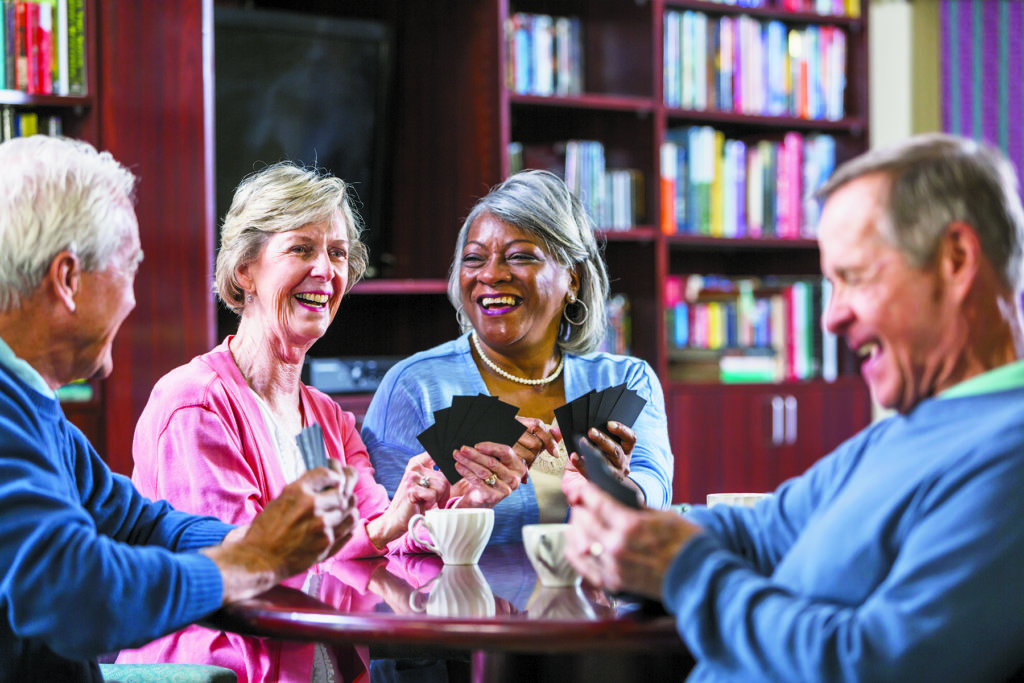
Yearly physical exams and regular consultations with financial advisors and other professionals are excellent ways for older adults to maintain physical and financial health, but with aging comes another equally important aspect of health that is too often put aside: emotional health. As a person ages, changes in our environment and lifestyle play a significant role in our emotional health. Whether it’s our children leaving home, our friends’ or our own retirements or the loss of a spouse or close friend, changes in our treasured relationships can make even the most upbeat person feel a bit blue.
While there’s nothing wrong with feeling at a loss sometimes—it’s part of being human—one of the best facets of our humanity is our ability to accept change and thrive in new situations.
Support comes from relationships
In my work as health and wellness manager at Jefferson’s Ferry Life Plan Community and out in the larger community, one of the biggest concerns I see on the horizon are people who don’t have a family support system. They may never have married, are widowed, have children who live far away or don’t have children. I particularly look out for and look after this group, as having a good support system is the foundation of overall wellness that encompasses physical, financial and emotional health.
Human beings are social creatures
Our connection to others enables us to survive and flourish. Spending too much time alone can leave us vulnerable to social isolation, loneliness and related health problems such as cognitive decline, depression and heart disease. Fortunately, there are ways to counteract these negative effects.
Building new relationships should be a primary goal. This could be a romantic partner, a confidante, a co-worker, someone to play cards with or a fellow volunteer. More important than the activity is the enjoyment that comes with being in the company of that person.
The number one strategy to building a relationship is to find a community. This can be challenging to the more introverted among us, but the first step is to make an effort to be a part of something outside yourself. Companions can motivate each other to get out in the world, try a new restaurant, check out a dance class or take a weekend trip, the possibilities are endless.
The health benefits of optimism
Our perceptions can affect our physical and mental health. Generally speaking, if you wake up thinking you’ll have a good day, you probably will. Likewise, if you expect to have a bad day, well, you get the point.
Research suggests that loneliness, social cohesion, community belonging, religiosity and spirituality each contribute to health outcomes, and finds that some psychological resources such as optimism and resilience, can be learned and strengthened. For example, those who are lonely are less socially active, eat less healthy diets, and report having more stress in their lives. Sharing a meal, on the other hand, encourages people to enjoy the social aspect of eating, which in turn leads to healthier eating, more eating, better nutrition and the priceless emotional benefit of company.
Older adults with negative perceptions of aging may believe that it’s natural to become more sedentary with age. Pairing an educational program aimed at changing older adults’ expectations regarding aging with an exercise class has been shown to get some formerly sedentary people on their feet.
Remove resistance to assistance
A hurdle that keeps many older adults isolated is resistance to assistance. Those of us in a senior services role often see this when it becomes clear a person needs a higher level of care. There has to be an understanding that when you’re getting the appropriate level of care, you’ll thrive. If, for example, you use up all your energy just getting ready to go out, you may opt to stay home. With just a little help, you can be on your way out the door with a fraction of the effort. Our challenge is to change people’s perceptions, accepting help as a positive so they can do more.
At Jefferson’s Ferry we look to elevate the seven dimensions of wellness: spiritual, physical, emotional, vocational, intellectual, environmental and social. Residents do this by joining committees,taking classes and participating in a wide variety of activities. Whether you live alone, with family or friends, in a community or commune, the more dimensions that you can embrace, the more well-rounded and healthy you can be, whatever your age.

Joanne Lehmann is the health and wellness manager at Jefferson’s Ferry Life Plan Community in South Setauket.

































